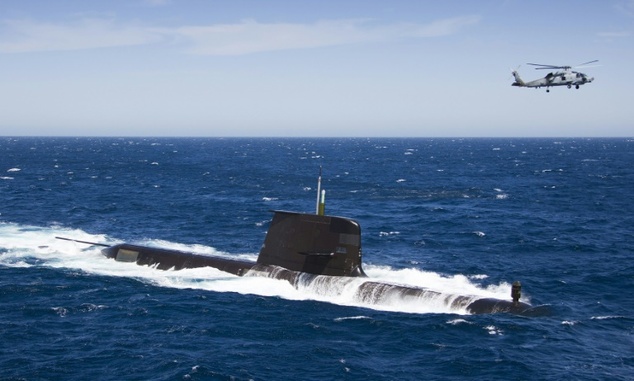
725 Squadron’s MH-60R ‘Romeo’ helicopter conducts an exercise with the Collins class submarine HMAS Rankin, off Jervis Bay, 200 km south of Sydney, Australia/AFP
SYDNEY, Australia, Apr 26 – French naval contractor DCNS Tuesday was picked ahead of Germany and Japan for a Aus$50 billion (US$39 billion) contract to design and build Australia’s next generation of submarines in the country’s biggest ever defence procurement programme.
The announcement by Prime Minister Malcolm Turnbull culminates years of planning to replace Australia’s ageing diesel and electric-powered Collins Class submarines, which are due to leave service from around 2026.
Turnbull said the 12 new subs “will be the most sophisticated naval vessels being built in the world”.
“The recommendation of our competitive evaluation process… was unequivocal, that the French offer represented the capabilities best able to meet Australia’s unique needs,” he added at an Adelaide shipyard, where the submarines will be constructed.
“This is a momentous national endeavour. This is securing together with our commitment to surface vessel construction, this is securing the future of Australia’s navy, over decades to come.”
French President Francois Hollande hailed the decision as historic.
“It marks a decisive advance in the strategic partnership between the two countries who will cooperate over 50 years,” his office said in a statement.
“This new success will create jobs and development in France as in Australia.”
A Japanese government-backed consortium led by Mitsubishi Heavy Industries, and German group ThyssenKrupp Marine Systems were also in the running, but DCNS was considered “best to meet all of our unique capability requirements”.
Besides matching the range and endurance of the Collins Class, the new generation needed to offer superior sensor performance and stealth capabilities.
DCNS has said it planned to build a 4,500-tonne conventionally-powered version of its 4,700 tonne Barracuda, to be named Shortfin Barracuda, described by the company as “the most technically complex artefact in Australia”.
It said on its website that the new vessel would be “the recipient of France’s most sensitive and protected submarine technology and will be the most lethal conventional submarine ever contemplated”.
“Pump jet propulsion means the Shortfin Barracuda can move more quietly than submarines with obsolete propeller technology,” DCNS said.
“In a confrontation between two otherwise identical submarines, the one with pump jet propulsion always has the tactical advantage.”
It added that the sonar suite performance “will be the best available ever for a submarine this size”.
Japan the early favourite
The government’s preferred combat system and main armament is the heavyweight torpedo jointly developed between the United States and Australia.
Japan was the early favourite to win the bid and last November its defence minister said handing Tokyo the contract would help bolster regional security, with some senior US officials, including former deputy secretary of state Richard Armitage, also backing a Japanese build.
Earlier this month, The Australian newspaper cited US officials backing Japan not just for the quality of the submarine involved but also for the development of deeper strategic, maritime cooperation between Canberra, Washington and Tokyo at a time of China’s rise.
For Australia, cooperating with Japan risked angering its biggest trading partner China. There were also reportedly concerns that Tokyo lacked experience in exporting such complex military hardware.
Asked if the decision to go with France would upset key ally the United States, Turnbull said the choice of contractor was “a sovereign decision for Australia”.
He added that bilateral relations with Japan were getting “stronger day by day”.
“And we’re committed to that and we are committed to our strong trilateral strategic engagement between Australia, Japan and the United States,” he said.
The tender process was also politically sensitive domestically, with Canberra keen to maximise Australian industry involvement and jobs. There were fears that any off-the-shelf purchase could kill off the domestic shipbuilding industry.
“This a great day for our navy, a great day for Australia’s 21st century economy, a great day for the jobs of the future,” said Turnbull.
“Australian built, Australian jobs, Australian steel, here right where we stand.”



































